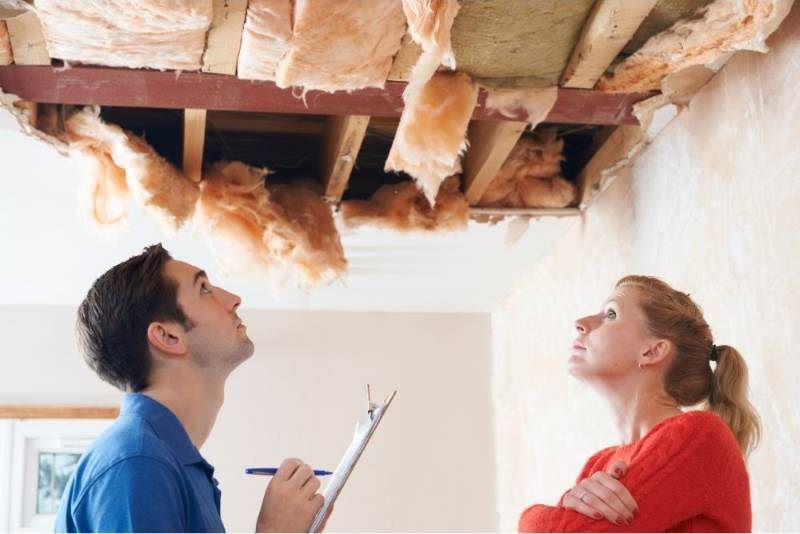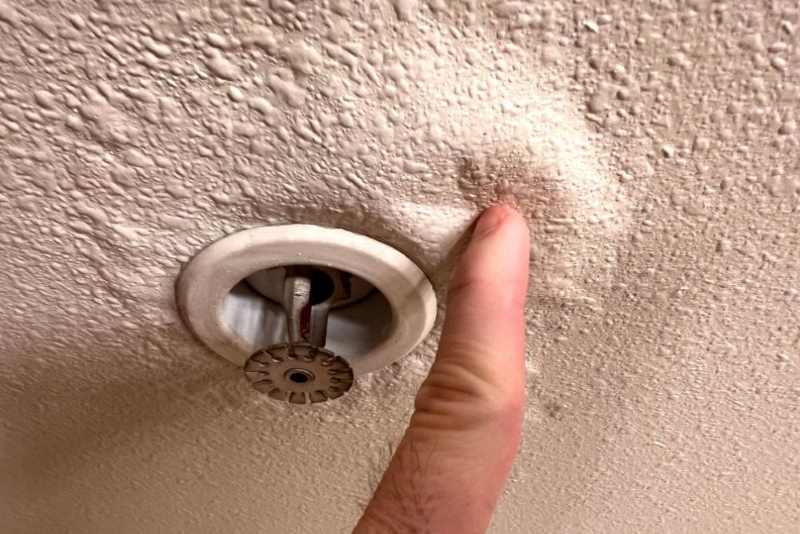You return home from vacation and discover a little puddle in your basement. Something inside the property may have leaked, overflowed, or burst. first thing you did? Freak out. And you’ll ask yourself, how can I get insurance coverage for this water damage? Relax and avoid panic. To find out how to deal with this kind of loss, continue reading through our extensive list of water damage insurance claim tips.
Common Types of Water Damage Insurance Claims

There are several different ways that water can enter your property. Anything from a broken washing machine hose to a backed-up sewer system. As such, a water damage insurance claim could result from a variety of issues.
You need to be aware of some of the most common types of water damage insurance claims. By taking the necessary precautions, you will be able to better protect yourself from them.
The following are common types of water damage insurance claims:
- Broken Appliances
- Broken or Burst Pipes
- Clogged Pipes
- Cracks in the Foundation
- Flooding
- Heavy Rain
- Leaking Roof
- Pipe Leaks
- Sewer Backup
- Snowmelt
What are the Water Damage Insurance Claim Tips?

Here are a few water damage insurance claim tips:
Locate the Damage’s Source and Shut It Off
To stop further damage, locate and shut off the supply valve if you can find the source of the leak or water flow, which could be a burst pipe or a broken water heater. If you are unable to locate the source of the leak, call a plumber immediately and ask them to solve the matter for you. In either scenario, keep any damaged parts or debris related to the appliance or burst water line so you can use them to support your water damage insurance claim.
Inform the Affected Individuals
Let’s say a neighbour or other third party has been affected by the water damage. If that’s the case, it’s essential to let them know about the circumstance so they can act promptly to limit the damage.
If the damage was caused by a problem with public infrastructure, please notify the city in person. If you give the municipality enough notice, you can be qualified for reimbursement.
Also, if you are a tenant, get in touch with the landlord right away. Inform your co-ownership if you are a co-owner.
Notify your Insurance Company
Any water damage should be reported right away to your homeowner’s insurance company. In the event of a natural disaster, the insurance provider will proceed on a first-come, first-served basis as they might be handling multiple claims that are comparable (particularly if the water damage was brought on by a significant downpour, melting snow, hurricane, frozen pipes, or flooding).
Submit the required claims forms after getting in touch with your insurance provider via phone, smartphone, or online claims portal. The quicker you report a claim, the faster an adjuster may assess the damage and reimburse you for life-saving repairs.
Save the Undamaged Things
Water damage, even a little, could damage the things you own. Move your undamaged things to prevent further damage after submitting a claim. Minimize your water damage insurance claim by saving things before the water gets to them. Moving things out of the damage will spare you the trouble of going out and buying new ones, as well as the time it would take to find money to replace them.
Document the Damages
Take pictures and/or record videos of any water damage. Take note of everything that has water damage and standing water. Having all of the documentation will make it easier for you to refute any unreported water damage when filing your claim. Keeping track of what you own, how much you paid for it, and its value can be helped by doing a thorough inventory of your property before a loss. At some point, the insurance company will ask you for this information to calculate your damages.
Remove Standing Water
If the water is dried up, it might not seep through baseboards, walls, floors, or cabinets. Consider calling an authorized water remediation company if the damage is more serious than you can repair. They are going to install fans, blowers, scrubbers, and other equipment in a way to try to prevent further damage to your property.
Show to Your Insurance Company the Damaged Area

A claim adjuster from the insurance company will visit your property to assess the extent of the water damage. You must wait to fix or remove any water damage in your house until your claim has been approved and evaluated. Your adjuster will measure and record the damage to assess the cost of repairing the water damage and identify its source.
If they are not liable for repairs, insurance companies want to ascertain the source of the damage before paying for water damage restoration services. For instance, the costs of repairs and basement waterproofing would be covered by the insurance company of the licensed plumber who built your shower and it leaked into the basement.
Learn When to Negotiate
Keep in mind that you don’t always have the upper hand when negotiating with your insurance company over water damage insurance claims. You might not qualify for full coverage, depending on your contract. In certain cases, the compensation you’ll get falls short of your expectations. This is an excellent opportunity to discuss your insurance company’s flexibility in repairing the water damage with the adjuster. In the worst situation, the cost of repairing your property will be entirely your own.
Start Water Damage Restoration
Once your insurance company has given you the go-ahead, you may approach them to have the damage repaired, regardless of whether you want to settle for the coverage they have offered or negotiated. Remember that there may be instances when you must wait for a technician or repair professional to be dispatched by your insurance company to your property. Also, you might not be able to pick your preferred professional.
Working with a local water damage restoration company of your choice can be the finest option if you’re seeking to repair and restore damaged areas of your property. To ensure that the restoration company you choose is the best fit for your needs, thoroughly look at their license, skills, and web reviews.
Prevent Mold Build-up
Your floors, walls, and belongings can stay damp even after the standing water has dried up. Such items may need to be thrown out, or mold (which can enter homes through air conditioning systems) may begin to grow in them.
To make sure your property is mold-free after repairs or replacements, think about hiring a mold remediation company to handle the remediation after a water loss or getting a mould test after using a water dry-out company.
With these water damage insurance claim tips, you can be certain that you’ll know what to do and how to claim your insurance in the event of water damage.
Frequently Asked Questions (FAQs)
What should I do if my water damage claim is denied?
If your water damage claim is denied, review your insurance policy and the denial letter carefully to understand the reasons for the denial. You may have the option to appeal the decision or seek assistance from a public adjuster or legal counsel.
Does homeowner’s insurance cover all types of water damage?
Homeowners insurance typically covers water damage caused by sudden and accidental events, such as burst pipes or appliance leaks. However, coverage may vary depending on the cause of the water damage and your specific insurance policy.
How long does it take to process a water damage insurance claim?
The time it takes to process a water damage insurance claim can vary depending on the complexity of the claim, the extent of the damage, and the responsiveness of the insurance company. In general, claims are typically processed within a few weeks to a few months.
Can I start repairs before the insurance company assesses the damage?
It’s advisable to wait for your insurance company to assess the damage before starting repairs, as they may need to inspect the damage firsthand to determine coverage. However, you can take steps to mitigate further damage in the meantime.
What should I do if I disagree with the insurance company’s assessment of the damage?
If you disagree with the insurance company’s assessment of the damage, you have the right to dispute their findings. Provide any additional evidence or documentation to support your claim and consider seeking assistance from a public adjuster or legal counsel.
Conclusion:
Dealing with water damage can be a challenging and stressful experience, but with the right approach, you can successfully navigate the insurance claims process and get the compensation you deserve. By following these water damage insurance claim tips and staying proactive and organized, you can protect your property and belongings and restore your peace of mind.


